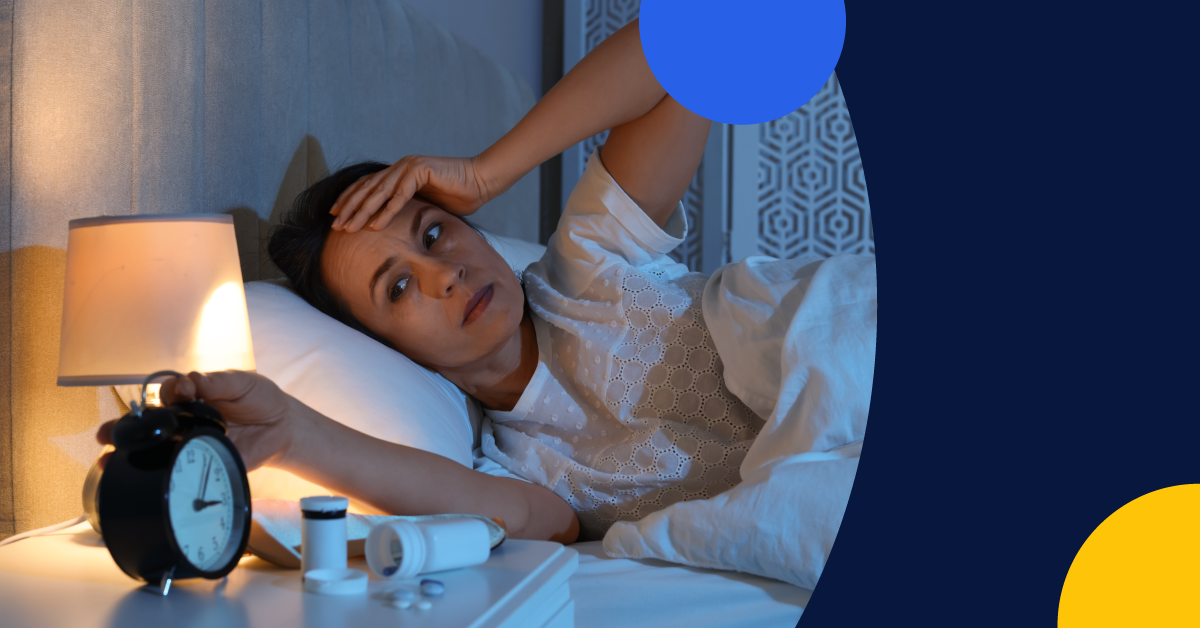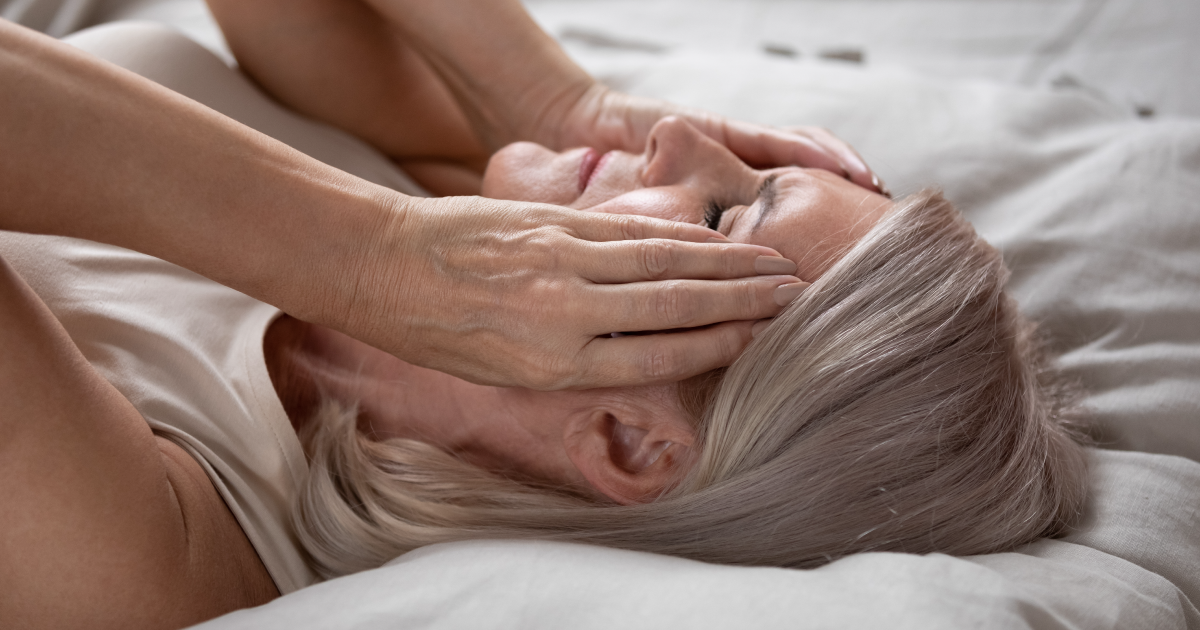Causes of High Blood Pressure at Night
Blood pressure high at night, also called nocturnal high blood pressure, holds distinct importance due to its characteristics compared to daytime blood pressure fluctuations. It is a risk factor for cardiovascular diseases and cardiovascular events such as heart attacks and strokes. It can also result in poor sleep, affecting overall well-being. Understanding the causes and implications of nocturnal hypertension is essential for better health management and the prevention of its associated health risks.

Master your heart health now
Take part in our 60sec quiz and get a heart health plan tailored just for you.
Contents
Start managing your heart health now!
Find out what works for you with this 60sec quiz.

High Blood Pressure at Night (Nocturnal Hypertension)
Nocturnal hypertension refers to elevated blood pressure during the night when a person is asleep. Throughout the daytime, normal blood pressure should remain below 120/80mmHg, with the number 120 representing the systolic blood pressure and 80 – the diastolic blood pressure. However, during nighttime, elevated blood pressure levels might surpass 110/65mmHg. Blood pressure naturally dips at night, but in individuals with nocturnal hypertension, it remains higher than normal. This condition is significant because it can be a marker of overall hypertension and poses additional health risks. Symptoms of high nighttime blood pressure may include:
- Early morning headaches: Due to increased blood pressure during sleep, individuals with nocturnal hypertension may wake up with headaches.
- Fatigue: Sleep problems due to elevated blood pressure at night can lead to daytime fatigue and decreased alertness.
- Frequent nocturnal urination: High blood pressure can put extra strain on the kidneys, increasing urine production during the night and disrupting sleep.
What Causes High Blood Pressure at Night?

High blood pressure at night can have various underlying causes, and it often results from a combination of various risk factors:
- Sleep apnea: Obstructive sleep apnea is a sleep disorder where breathing repeatedly stops and starts during sleep. It can lead to nocturnal hypertension as the disrupted sleep patterns cause stress on the cardiovascular system.
- Kidney disease: The kidneys play a vital role in regulating blood pressure. Any kidney dysfunction can disrupt this regulation, leading to high blood pressure, especially at night.
- Hormonal imbalances: Hormones like cortisol, which follow a circadian rhythm, can affect blood pressure. An imbalance in these hormones may result in nocturnal hypertension.
- Certain medications: Some medications, like corticosteroids or non-steroidal anti-inflammatory drugs (NSAIDs), can raise blood pressure. Taking these medications before bedtime may contribute to nocturnal hypertension.
- High salt intake before bedtime: Consuming a high-salt meal before bedtime can cause fluid retention and nocturnal blood pressure.
- Alcohol or caffeine consumption in the evening: These substances can disrupt sleep patterns and sometimes lead to higher blood pressure at night.
- Chronic stress: Persistent stress and anxiety can raise blood pressure levels, and these effects can be more pronounced during nighttime when the body should be at rest.
- Obesity: Excess body weight and abdominal obesity are risk factors for hypertension. Obesity can contribute to high blood pressure both day and night.
- Diabetes: Uncontrolled diabetes can damage blood vessels and contribute to hypertension, including nocturnal hypertension.
- Age and genetics: As people age, their risk of hypertension increases. Genetics also significantly determine an individual’s susceptibility to high blood pressure, including nocturnal hypertension.
It’s essential to identify the specific cause of high blood pressure at night to develop an appropriate treatment plan. Lifestyle modifications, medication, and addressing any underlying medical conditions are common approaches to managing nocturnal hypertension. Regular monitoring and consultation with a healthcare professional are crucial for effective management.
Start managing your heart health now!
Find out what works for you with this 60sec quiz.

Complications and Risks of High Blood Pressure at Night
Nocturnal blood pressure can lead to several severe complications and risks, which can significantly impact one’s overall health. Here are some of the potential consequences:
- Stroke: Prolonged high blood pressure can damage the brain, posing a higher risk of stroke. Nocturnal blood pressure may contribute to this risk.
- Heart Disease: Nocturnal hypertension strains the heart, increasing the likelihood of developing various heart conditions, including coronary artery disease and heart failure.
- Kidney Damage: High blood pressure can harm the kidneys, impairing their ability to filter waste and regulate fluid balance, potentially leading to kidney disease or failure.
- Memory Problems: Chronic high blood pressure has been linked to cognitive impairment and an increased risk of dementia in later life.
- Vision Loss: Hypertension may lead to vision problems and loss.
- Atherosclerosis (Hardening of Arteries): High blood pressure contributes to the development of atherosclerosis, a condition in which arteries become narrowed and hardened, increasing the risk of heart attack and stroke.
- Left Ventricular Hypertrophy: Nocturnal hypertension can enlarge the heart’s left ventricle, the chamber responsible for pumping blood to the body. This condition can weaken the heart and lead to heart failure.
How to Treat High Blood Pressure at Night?

Treating high blood pressure at night often involves a combination of lifestyle factors, blood pressure medication, and other medical interventions. Here are some tips on how to manage and prevent high blood pressure at night:
- Adjusting Medication Timings: If you’re taking blood pressure medications, consult your healthcare provider about the timing of your medication. Some medications may be more effective when taken at specific times, including before bedtime.
- Lifestyle Changes: Make heart-healthy lifestyle changes, such as reducing salt and caffeine intake. A low-sodium diet can help control blood pressure, and avoiding caffeine before bedtime can improve sleep quality.
- Treating Underlying Conditions: If you have sleep apnea or other sleep disorders contributing to your nocturnal hypertension, seek treatment for these conditions. This may involve using a continuous positive airway pressure (CPAP) machine or other therapies recommended by a sleep specialist.
- Home Blood Pressure Monitoring: Monitor your blood pressure pattern and changes, especially at night, if possible. Tracking your blood pressure readings can reveal how lifestyle choices impact your heart health. Consider using the Cardi Health app for an easy and convenient way to monitor your blood pressure. It offers user-friendly features to help you stay on top of your heart health.
- Weight Management: Poor diet and excess weight can contribute to nocturnal hypertension. Losing weight can significantly reduce blood pressure levels, including the night ones. Maintain a heart healthy diet and engage in regular physical activity to achieve and maintain a healthy weight.
- Limiting Alcohol and Tobacco Use: Reduce or eliminate alcohol and tobacco use, as both can raise blood pressure and disrupt sleep patterns.
- Stress-Relief Techniques: Incorporate stress-reduction techniques into your daily routine. Practices such as meditation, yoga, deep breathing exercises, and regular physical activity can help lower stress levels and improve blood pressure control.
- Diuretics or Other Antihypertensive Medications: Depending on your specific condition and blood pressure levels, your healthcare provider may prescribe antihypertensive medications, such as diuretics, ACE inhibitors, or beta-blockers, to help control blood pressure, especially at night.
- Restricting Fluid Intake Before Bedtime: Limiting fluid intake in the hours leading up to bedtime can reduce the likelihood of nighttime awakenings to urinate, helping to maintain lower blood pressure during sleep.
- Sleeping in a Head-Elevated Position: Elevating the head of your bed or using extra pillows can help reduce the risk of nocturnal blood pressure, especially if you have sleep apnea symptoms.
Start managing your heart health now!
Find out what works for you with this 60sec quiz.

FAQs
Now, let’s address some frequently asked questions related to the topic.
What are the primary symptoms of nocturnal hypertension?
Nocturnal hypertension symptoms include early morning headaches, fatigue, and frequent nocturnal urination. These symptoms may not always be obvious, and some hypertensive patients may not experience any noticeable symptoms. Regular blood pressure monitoring and consultation with a healthcare professional are essential for effectively detecting and managing this condition.
How do lifestyle choices, like diet and evening habits, impact nighttime blood pressure?
Lifestyle choices, such as a high salt intake and consuming alcohol or caffeine before bedtime, can raise nighttime blood pressure.
What complications can arise from untreated high blood pressure at night?
Untreated high blood pressure at night can lead to heart attack, stroke, and other cardiovascular problems due to the added strain on the heart and blood vessels during sleep.
How can one manage and treat high blood pressure, specifically during the nighttime?
Managing and treating nocturnal hypertension involves adjusting medication timings, making lifestyle changes, addressing underlying conditions, and using specific sleeping positions.
Conclusion

Nocturnal hypertension, a condition characterized by high blood pressure during sleep, poses significant health risks and complications, including an increased likelihood of strokes, heart disease, kidney damage, memory problems, vision loss, and more. Effective management and prevention strategies involve lifestyle modifications, timely medication, treatment of underlying conditions like sleep apnea, weight management, stress reduction, and regular blood pressure monitoring at home. Consider using the Cardi Health app for an easy and convenient way to monitor your blood pressure. It offers user-friendly features to help you stay on top of your heart health. Awareness and proactive measures are vital for safeguarding overall cardiovascular health, especially during nighttime.
Related articles
Best Foods to Lower Cholesterol
Does Caffeine Raise Blood Pressure?
Does Drinking Water Lower Blood Pressure?
10 DASH Diet Breakfasts for a Healthy Start
Heart-Healthy Diet Guide
What Should an 85-Year-Old Blood Pressure Be?
What is Normal Blood Pressure for a 70-Year-Old?
How to Read Blood Pressure: A Comprehensive Guide
Wearing a Heart Monitor for 2 Weeks: What You Need to Know
Manage your heart health now
Find out what works best for you with this 60sec quiz and get your personalized heart health plan.

